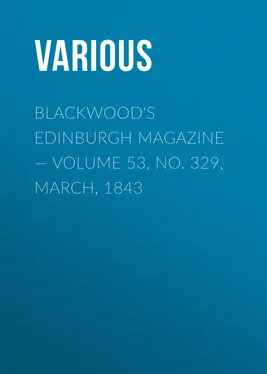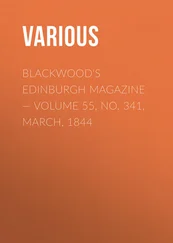Various - Blackwood's Edinburgh Magazine — Volume 53, No. 329, March, 1843
Здесь есть возможность читать онлайн «Various - Blackwood's Edinburgh Magazine — Volume 53, No. 329, March, 1843» — ознакомительный отрывок электронной книги совершенно бесплатно, а после прочтения отрывка купить полную версию. В некоторых случаях можно слушать аудио, скачать через торрент в формате fb2 и присутствует краткое содержание. Издательство: Иностранный паблик, Жанр: foreign_antique, periodic, foreign_edu, на английском языке. Описание произведения, (предисловие) а так же отзывы посетителей доступны на портале библиотеки ЛибКат.
- Название:Blackwood's Edinburgh Magazine — Volume 53, No. 329, March, 1843
- Автор:
- Издательство:Иностранный паблик
- Жанр:
- Год:неизвестен
- ISBN:нет данных
- Рейтинг книги:3 / 5. Голосов: 1
-
Избранное:Добавить в избранное
- Отзывы:
-
Ваша оценка:
- 60
- 1
- 2
- 3
- 4
- 5
Blackwood's Edinburgh Magazine — Volume 53, No. 329, March, 1843: краткое содержание, описание и аннотация
Предлагаем к чтению аннотацию, описание, краткое содержание или предисловие (зависит от того, что написал сам автор книги «Blackwood's Edinburgh Magazine — Volume 53, No. 329, March, 1843»). Если вы не нашли необходимую информацию о книге — напишите в комментариях, мы постараемся отыскать её.
Blackwood's Edinburgh Magazine — Volume 53, No. 329, March, 1843 — читать онлайн ознакомительный отрывок
Ниже представлен текст книги, разбитый по страницам. Система сохранения места последней прочитанной страницы, позволяет с удобством читать онлайн бесплатно книгу «Blackwood's Edinburgh Magazine — Volume 53, No. 329, March, 1843», без необходимости каждый раз заново искать на чём Вы остановились. Поставьте закладку, и сможете в любой момент перейти на страницу, на которой закончили чтение.
Интервал:
Закладка:
Various
Blackwood's Edinburgh Magazine — Volume 53, No. 329, March, 1843
AMMALÁT BEK
A TRUE TALE OF THE CAUCASUS
TRANSLATED FROM THE RUSSIAN OF MARLÍNSKI. BY THOMAS B. SHAW, B.A. OF CAMBRIDGE, ADJUNCT PROFESSOR OF ENGLISH LITERATURE IN THE IMPERIAL LYCEUM OF TSARSKOË SELO.
THE TRANSLATOR'S PREFACE
The English mania for travelling, which supplies our continental neighbours with such abundant matter for wonderment and witticism, is of no very recent date. Now more than ever, perhaps, does this passion seem to possess us:
"——tenet insanabile multos
Terrarum κακοηθες, et ægro in corde senescit:"
when the press groans with "Tours," "Trips," "Hand-books," "Journeys," "Visits."
In spite of this, it is as notorious as unaccountable, that England knows very little, or at least very little correctly, of the social condition, manners, and literature of one of the most powerful among her continental sisters.
The friendly relations between Great Britain and Russia, established in the reign of Edward V., have subsisted without interruption since that epoch, so auspicious to both nations: the bond of amity, first knit by Chancellor in 1554, has never since been relaxed: the two nations have advanced, each at its own pace, and by its own paths, towards the sublime goal of improvement and civilization—have stood shoulder to shoulder in the battle for the weal and liberty of mankind.
It is, nevertheless, as strange as true, that the land of Alfred and Elizabeth is yet but imperfectly acquainted with the country of Peter and of Catharine. The cause of this ignorance is assuredly not to be found in any indifference or want of curiosity on the part of English travellers. There is no lack of pilgrims annually leaving the bank of Thames,
"With cockle hat and staff,
With gourd and sandal shoon;"
armed duly with note-book and "patent Mordan," directing their wandering steps to the shores of Ingria, or the gilded cupolas of Moscow. But a very short residence in the empire of the Tsar will suffice to convince a foreigner how defective, and often how false, is the information given by travellers respecting the social and national character of the Russians. These abundant and singular misrepresentations are not, of course, voluntary; and it may not be useless to point out their principal sources.
The chief of these is, without doubt, the difficulty and novelty of the language, and the unfortunate facility of travelling over the beaten track—from St Petersburg to Moscow, and from Moscow, perhaps, to Nijny Nóvgorod, without any acquaintance with that language. The foreigner may enjoy, during a visit of the usual duration, the hospitality for which the higher classes are so justly celebrated; but his association with the nobility will be found an absolute obstacle to the making even a trifling progress in the Russian language; which, though now regaining a degree of attention from the elevated classes, 1 1 There is, strictly speaking, no middle class in Russia; the "bourgeoisie," or merchants, it is true, may seem to form an exception to this remark, but into their circles the traveller would find it, from many reasons, difficult, and even impossible, to enter.
too long denied to it by those with whom their native tongue was an unfashionable one—he would have no occasion at all to speak, and not even very frequent opportunities of hearing.
But even in those rare cases where the stranger united to a determination to study the noble and interesting language of the country, an intention of remaining here long enough to learn it, he was often discouraged by the belief, that the literature was too poor to repay his time and labour. Besides, the Russian language has so little relation to the other European tongues—it stands so much alone, and throws so little direct light upon any of them, that another obstacle was thrown into his way.
The acquisition of any one of that great family of languages, all derived, more or less remotely, from the Latin, which extends over the whole south and west of Europe, cannot fail to cast a strong light upon the other cognate dialects; as the knowledge of any one of the Oriental tongues facilitates, nay almost confers, a mastery over the thousand others, which are less languages of distinct type than dialects of the same speech, offshoots from the same stock.
Add to this, the extraordinary errors and omissions which abound in every disquisition hitherto published in French, English, and German periodicals with regard to Russian literature, and deform those wretched rags of translation which are all that has been hitherto done towards the reproduction, in our own language, of the literature of Russia. These versions were made by persons utterly unacquainted with the country, the manners, and the people, or made after the Russian had been distilled through the alembic of a previous French or German translation.
Poetry naturally forces its way into the notice of a foreign nation sooner than prose; but it is, nevertheless, rather singular than honourable to the literary enterprise of England, that the present is the first attempt to introduce to the British public any work of Russian Prose Fiction whatever, with any thing like a reasonable selection of subject and character, at least directly from the original language.
The two volumes of Translations published by Bowring, under the title of "Russian Anthology," and consisting chiefly of short lyric pieces, would appear at first sight an exception to that indifference to the productions of Russian genius of which we have accused the English public; and the popularity of that collection would be an additional encouragement to the hope, that our charge may be, if not ill-founded, at least exaggerated.
We are willing to believe, that the degree—if we are rightly informed, no slight one—of interest with which these volumes were welcomed in England, was sufficient to blind their readers to the extreme incompetency with which the translations they contained were executed.
It is always painful to find fault—more painful to criticise with severity—the work of a person whose motive was the same as that which actuates the present publication; but when the gross unfaithfulness 2 2 In making so grave a charge, proof will naturally be required of us. Though we might fill many pages with instances of the two great sins of the translator, commission and omission, the poco piu and poco meno , we will content ourselves with taking, ad aperturam libri , an example. At page 55 of the Second Part of Bowring's Russian Anthology, will be found a short lyric piece of Dmítrieff, entitled "To Chloe." It consists of five stanzas, each of four very short lines. Of these five stanzas, three have a totally different meaning in the English from their signification in the Russian, and of the remaining two, one contains an idea which the reader will look for in vain in the original. This carelessness is the less excusable, as the verses in question present nothing in style, subject, or diction, which could offer the smallest difficulty to a translator. Judging this to be no unfair test, (the piece in question was taken at random,) it will not be necessary to dilate upon minor defects, painfully perceptible through Bowring's versions; as, for instance, a frequent disregard of the Russian metres—sins against costume , as, for example, the making a hussar (a Russian hussar) swear by his beard , &c. &c. &c.
exhibited in the versions in question tends to give a false and disparaging idea of the value and the tone of Russian poetry, we may be excused for our apparent uncourteousness in thus pointing out their defects.
Интервал:
Закладка:
Похожие книги на «Blackwood's Edinburgh Magazine — Volume 53, No. 329, March, 1843»
Представляем Вашему вниманию похожие книги на «Blackwood's Edinburgh Magazine — Volume 53, No. 329, March, 1843» списком для выбора. Мы отобрали схожую по названию и смыслу литературу в надежде предоставить читателям больше вариантов отыскать новые, интересные, ещё непрочитанные произведения.
Обсуждение, отзывы о книге «Blackwood's Edinburgh Magazine — Volume 53, No. 329, March, 1843» и просто собственные мнения читателей. Оставьте ваши комментарии, напишите, что Вы думаете о произведении, его смысле или главных героях. Укажите что конкретно понравилось, а что нет, и почему Вы так считаете.












